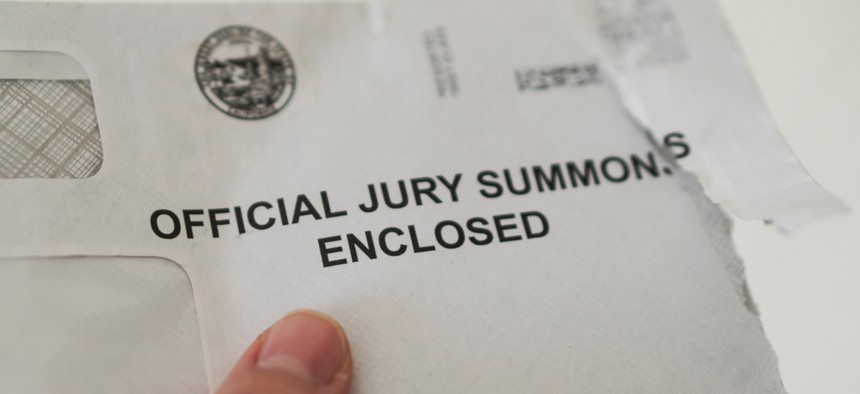Florida Lawmakers Want to Prohibit Jail Sentences for Missed Jury Duty

The penalties for missing jury duty are set at the state level and can include summons for a new date, an order to appear in court and explain the absence, a fine and, in the most extreme cases, arrest and imprisonment. Shutterstock
The legislation they introduced is inspired by the case of a college student who overslept on the day he was supposed to sit on a jury and was sentenced to 10 days in jail.
In September of last year, a court case in Florida made national headlines. It wasn’t the typical zany tale of a “Florida Man,” but the story of a 21-year-old college student who was sent to jail for oversleeping and missing jury duty.
Deandre Somerville, who had no criminal history, was supposed to serve on the jury for a civil vehicular negligence case that proceeded without him when he didn’t turn up.
Judge John Kastrenakes, a civil court judge in Palm Beach County, found Somerville in contempt of court, sentencing him to 10 days in jail, 150 hours of community service, a year of probation, and $223 in fees. The judge also required Somerville to write an apology letter for missing his juror stint.
Now, two state lawmakers want to ensure that no one else ends up behind bars over a case of missed jury duty. Sen. Bobby Powell and Rep. Al Jacquet, both Democrats, introduced bills last week that would curtail a judge’s ability to punish people who miss jury duty.
“No one deserves to be jailed for unintentionally missing jury duty,” Powell tweeted in an announcement of the bill.
Powell previously called for Kastrenakes to be removed from office and filed a complaint with the state Judicial Qualifications Commission, which did not take up the case.
The bill he introduced with Jacquet would forbid judges from using jail time as a punishment for missed jury duty. It would also limit any fine that judges can impose to $100.
The penalties for missing jury duty are set at the state level and can include summons for a new date, an order to appear in court and explain the absence, a fine and, in the most extreme cases, arrest and imprisonment. Spending time in jail for contempt of court, like the sentence Somerville received, shows up on a person’s criminal record.
The average nationwide failure-to-appear rate for jurors in state courts is 9%, but in some jurisdictions the rate is as high as 50%. Usually, nothing happens to people who miss jury duty, but some judges have begun cracking down in recent years to discourage high no-show rates.
Jacquet said that jail time shouldn’t be used to teach a civics lesson. “We know that jury service is a shared American tradition. It teaches values of participation, equality, and deliberation,” he said in a statement. “However, punishing our citizens with jail time for missing jury duty should not be a resolution.”
Kasternakes denied charges that his sentence was overly harsh and racially biased against Somerville, who is black. Instead, the judge argued the opposite—that Somerville’s presence was necessary because he was the only black person on the jury.
After national outcry about Somerville’s jail stay, however, the judge vacated part, and then later all, of his remaining sentence, eliminating the community service, fees, and probation requirements. He also cleared Somerville’s criminal record of the charge. In the order to vacate, Kastrenakes said that he imposed the sentence “so that others could learn and take heed that serving on a jury is serious business deserving of attention, respect, and adherence to their oaths.”
Somerville still had to read an apology letter to the court, in which he expressed his regret for oversleeping. “This was an immature decision that I made, and I paid the price for my freedom,” he read. “As a result of my irresponsible actions, my life has been forever changed. Everything I’ve gone through I would not wish on my worst enemy.”
Emma Coleman is the assistant editor for Route Fifty.
NEXT STORY: What Happened to the Anti-Alcohol Movement?






